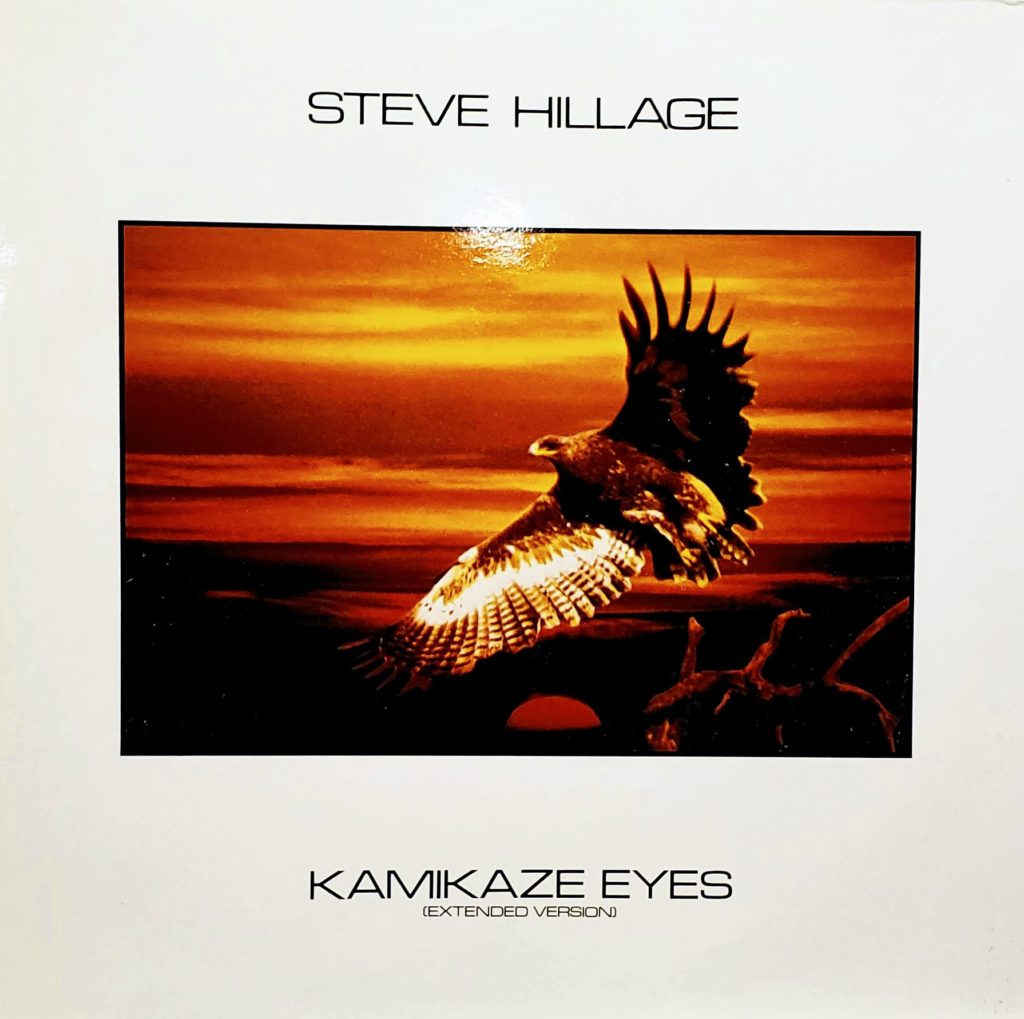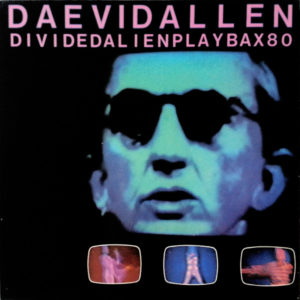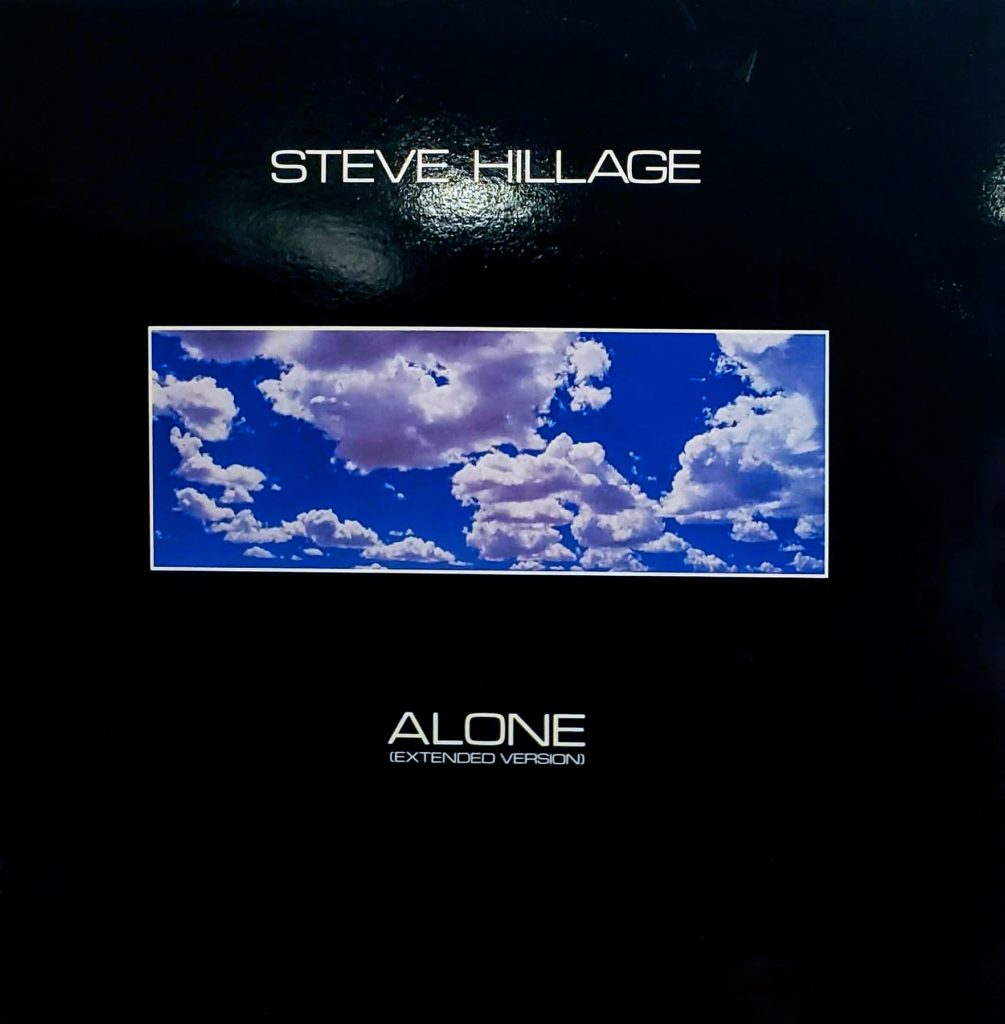Steve Hillage
Alone (Extended Version)
Kamikaze Eyes (Extended Version)
Timelines
Before The World Was Made
Steve Hillage is a guitarist whose work has spanned over 50 years, but I hadn’t heard of him until this year – when I stumbled upon his work in one of the most backwards ways possible.
Earlier in the year I was in a record store in Kichijoji when I happened upon this. The album is by Daevid Allen, and it’s called Divided Alien Playbax 80. I knew nothing about it when I saw it, but I was immediately attracted to the cover. It had a crazy vaporwave vibe to it, despite the fact that it came out in 1982. I gave it a quick listen, decided that it was properly weird, and at 400 yen (about four bucks) I decided to pick it up.
Unfamiliar with Allen when I bought the album, I learned that it’s a remix album of a prior release by Allen’s previous group, New York Gong. That group would breakup after it’s sole 1980 album, but the group (sans Allen) would continue as the influential no-wave dance outfit Material. Turns out I accidentally bought an album with Bill Laswell on it (that happens a lot). New York Gong, as its name would suggest, was a New York offshoot of Allen’s original group, Gong.
From there, I decided to give Gong a shot and ,long story short, several months and I don’t know how many albums later, I have become obsessed with the group. They’re utterly mad, an the most obvious example of “music made on drugs to take drugs to” that has ever been committed to wax. Not too soon after discovering the wonderful world of the flying teapot (look it up) I started to seek out solo albums by members of the group, starting with Allen and then moving onto Hillage.
As a solo artist though, Hillage would only release one more proper studio album, 1982’s For To Next. I don’t know how his fans responded to it at the time, but I can’t imagine that many of them liked it. While his previous work always straddled the line between pop and the avant-garde, between progressive rock and synth-pop, this album didn’t just jump over into the pop spectrum, it pole vaulted. Hillage’s amazing spacey guitar sound is still there, but as part as synthesizer-heavy pop numbers, many of which could be mistaken for Gary Numan tracks. It goes to show that Genesis and Yes weren’t the only prog acts looking to synthpop to reinvent themselves in the 80s, that’s for sure.
As much as I like For To Next, I do think that’s its probably Hillage’s weakest effort next to his purely ambient 1979 Rainbow Dome Musick, which is too mellow even more my Tangerine Dream-loving ass. It’s simultaneously not synth-pop enough and not prog enough. I feel like he had to move more in one direction. Either embrace his proggy side, or dive head first into pop ala Inivisible Touch.
After working mostly as a producer in the 80s, he’s since committed himself solely to electronic music. Today, he releases music as System 7, alongside his partner Monique Giraudy. They have a prog rock side to them, but they’re much more ambient than anything else. Think The Orb. I sadly don’t have much by them yet, but I’m still listening to his solo stuff so much I’m in no hurry.
Anyways, I’ve blathered on for nearly 800 words without even mentioning the songs I’m sharing tonight! These four numbers come from 12″ singles taken from the For To Next album. The original versions of “Alone” and “Kamikaze Eyes” are on the album proper, while the other tracks are B-sides. “Alone” has a good riff, but it’s the weaker of the two. “Kamikaze Eyes” is a banger of a track, I hope it was the lead single for the album, it’s by far the best number on it. Catchy as hell, good beat, good guitar solo, good lyrics. Great all around. Definitely should’ve been at least a minor hit.
Both “Timelines” and “Before The World Was Made” are instrumentals, and good ones at that. Again, while For To Next isn’t the best album, I really wish Hillage would’ve experimented more with this style, he could’ve had something.
Anyways, if you’ve read all of this (congrats) and you want to know a good starting off point for Hillage’s solo stuff, I say you can’t go wrong with L, Green, Open or Motivation Radio (Fish Rising is good too, but a little rougher around the edges). Also, his Live Herald and Dusseldorf live albums are good starting points too, as they both feature a lot of his best work. He was also a member of the group Khan, and their sole offering, 1972’s Space Shanty, is some good prog-ass prog if that’s your scene.
And if you’re thinking about getting into Gong, well, that’s a bit trickier. I’d say either start with You or Flying Teapot. If either of those albums don’t drive you insane, then you’ll probably dig the other stuff by Gong proper. Be warned there are two Gongs. When the band broke up, it was reborn as Pierre Moerlen’s Gong and they are way more jazz fusion than prog. Seriously. You’ve been warned.




OK, you are freaking me out. My best mate at high school was, and is, a very good guitarist – and loved Steve Hillage (we’re talking late 70s) – I have never heard anyone else rave about him. The world is weird.
Doubly weirdly I had never made the connection between Hillage and Daevid Allen. But just quietly, I don’t get the attraction for either. I feel like a traitor (Allen being Australian) and a bad friend (I don’t give a shit about Hillage no matter how much Dave liked him).
Funny you mentioned The Orb — this is the only place I’d heard Steve Hillage’s name before. He’s credited with writing on a couple of the tracks on the first Orb album. Will have to give his other work a try. Ashley Bates (drummer from Chapterhouse) has spent some time in Gong, too.
Been a GONG & Hillage fan from the 70s on. Seen em several times. If you’re enjoying GONG, you should check out OZRIC TENTACLES. They took the Hillage/Gong formula and ran with it. They’ve been at it since 83, with many, many releases. Only “drawback” is: if you like some of their stuff, you’ll pretty much like it all. Sure, they experiment a lot, but they always play in the same ballpark. Not exactly a complaint if it works in your favor. Like your site. Keep up the good work!
– Byron Werner, Little Rock, Arkansas, USA
System 7’s early albums are great. Some lovely clear discs to look for as well (Sunburst and Habibi).
I have long followed Steve Hillage’s work. I happened to go to Simon Langton Grammar school in the 60s where we had a band in the 6th form called Wilde Flowers who split into Soft Machine and Caravan, creating the Canterbury Scene. Soft Machine recorded a single played in our assembly with an unknown guitarist called Jimi Hendrix before teaming up with Daevid Allen. They were much bigger in France but Allen couldn’t get back to Britain due to visa problems. Various members of Soft Machine continued to work with Gong, most notably Robert Wyatt. If you aren’t familiar with him then do try his albums – I think you’d like Rock Bottom. Hillage said he chose to go to University of Kent at Canterbury because of the Canterbury Scene and, of course, ended up working with Wyatt et al. Gong may not be the most obvious example of “music made on drugs to take drugs to†though. Kevin Ayers (also ex Soft Machine) did some amazing stuff, e.g. the Confessions of Doctor Dream and Other Stories.
And yes… Steve Hillage is a god.